#dybbuks
Explore tagged Tumblr posts
Text
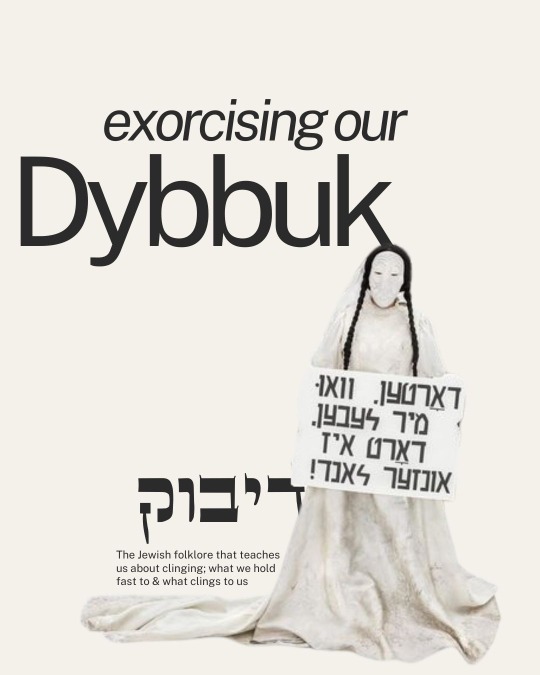
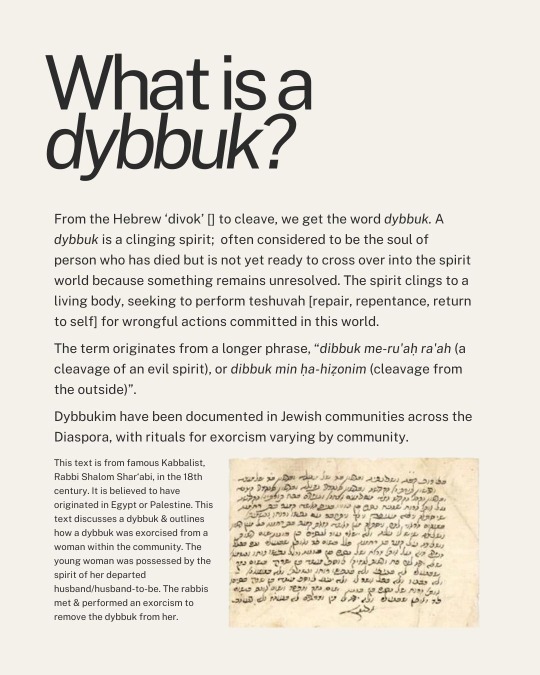
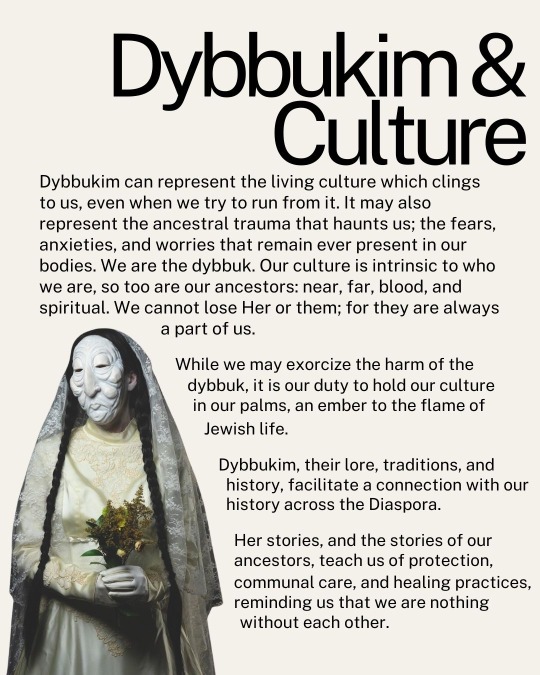
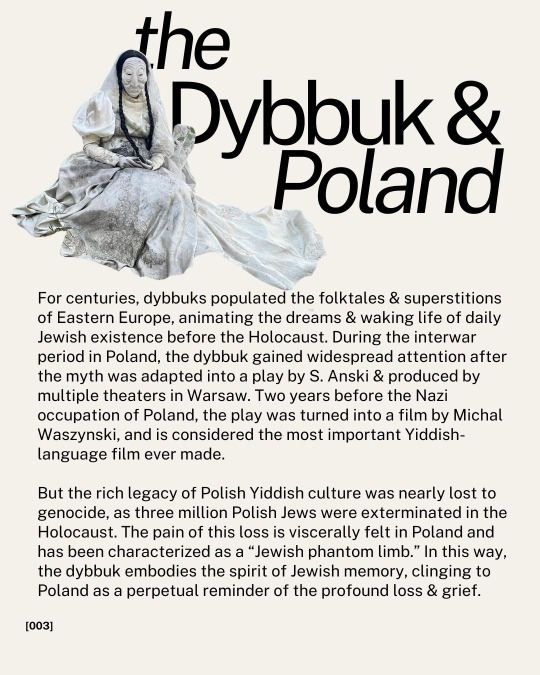
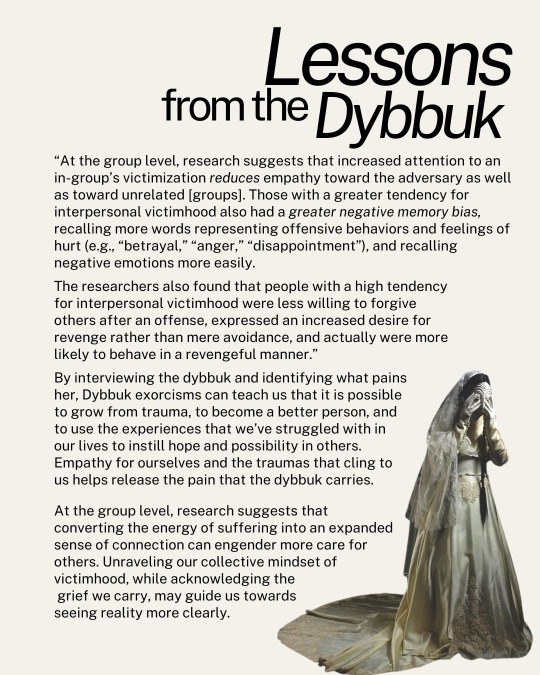
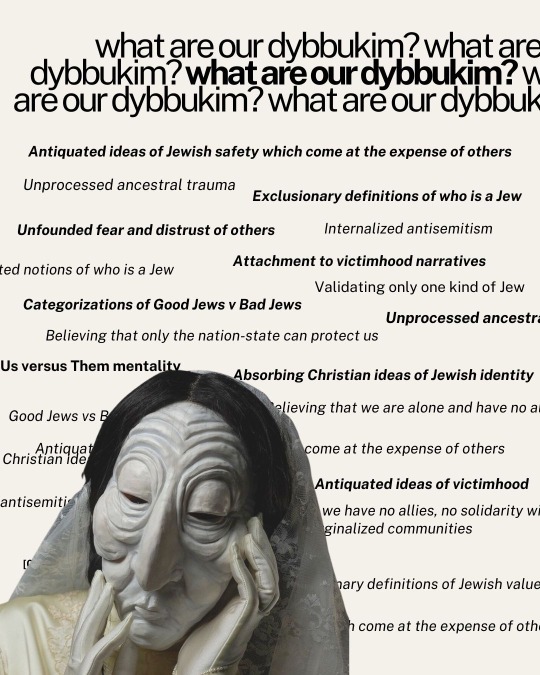
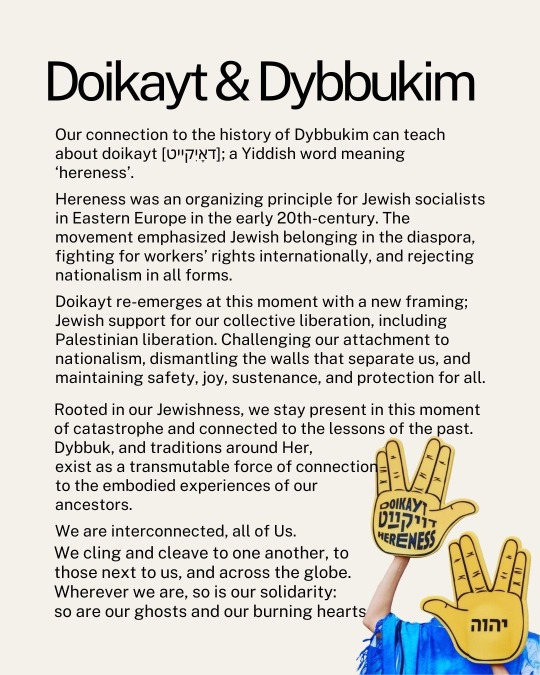
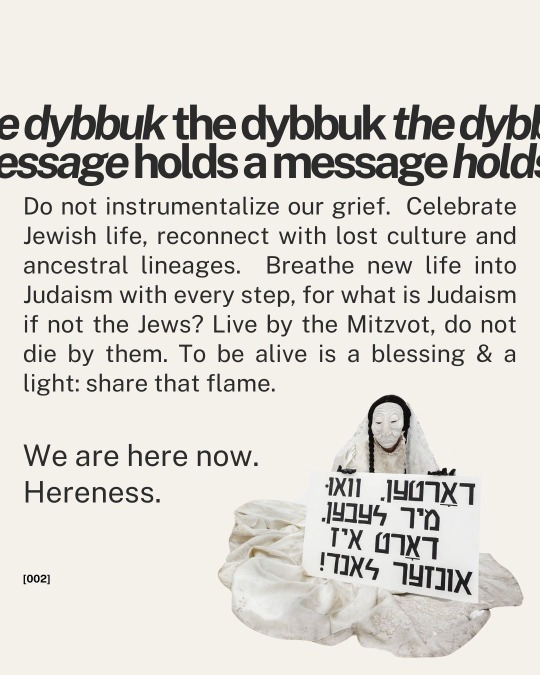
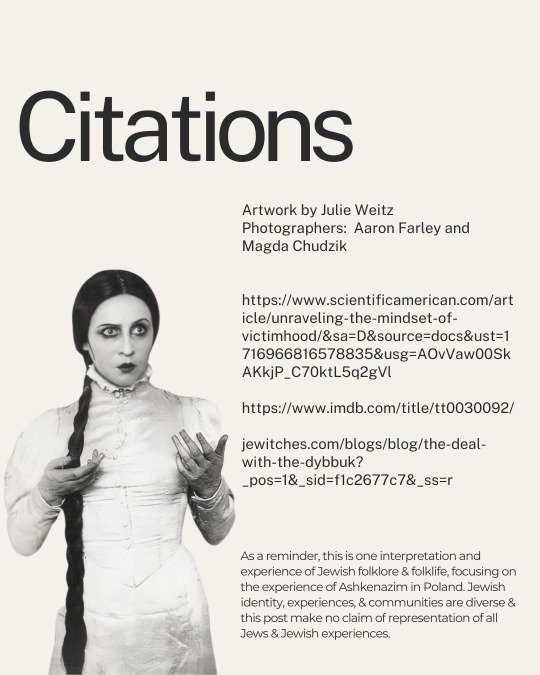
What are Dybbukim? How can we interpret our tradition surrounding them during this fraught moment, as Jewish communities cling to and cleave from tradition, spirituality, and ḥesed (loving-kindness)?
What are our dybbukim?
How does the tradition of Dybbukim engage with our values of Hereness?
As we seek international solidarity while remaining rooted in Jewishness; transformational and yet, demanding of us to be present and connected to the past, never without our roots & the conditions that we re-imagine this ancestral wisdom in.
The stunning images were created by @mygolem_is_here and photographers Aaron Farley and Magda Chudzik.
As a reminder, this is one interpretation and experience of Jewish folkore and folklife. This post focuses on the experience of Ashkenazim in Poland. Jewishness is diverse & vast: this post serves as representation of one facet of it.
Julie Wetz resides in Poland.
527 notes
·
View notes
Text
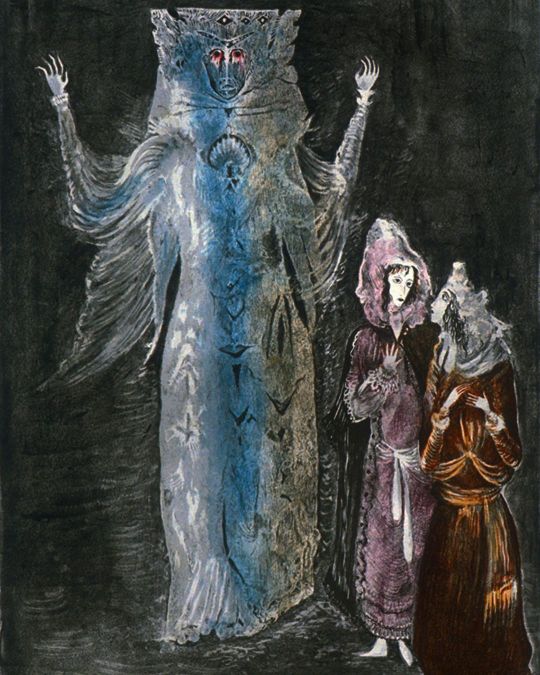
Leonora Carrington’s (b. UK, 1917-2011) “Dybbuk Suite”, after the Yiddish play “The Dybbuk/דער דיבוק” by S. Ansky.
"The Dybbuk" relates the story of a young bride possessed by the the malicious spirit of her dead beloved on the eve of her wedding. First staged in in Warsaw by the "Vilna Troupe", it is considered a seminal play in the history of Yiddish theatre. The story is based on years of research by Shloyme Ansky, who travelled between villages in Belarus and Ukraine, documenting Jewish folk beliefs and tales. The Dybbuk is known as the dislocated soul of a dead person in Eastern European Ashkenazi mythology, deriving from the Hebrew word דִּיבּוּק dibbūq, meaning 'a case of attachment', which is a nominal form of the verb דָּבַק dābaq 'to adhere' or 'cling'.
463 notes
·
View notes
Text
i know this isnt like a super bad thing but it infuriates me to no end when non-jews use our folklore and folkloric creatures without doing literally any research. this isn't just writers or artists using golems and dybbuks without putting in thought as to how these are deeply important, significant creatures in our stories, it's also random people with horribly misconceptions about our folklore and stories. personally superstitions and folklore have always been one of my favorite parts of being jewish, and i HATE seeing our stuff used for cheap stuff. like i genuinely want to take our folklore away from goyim until they learn to do actual research and be respectful.
180 notes
·
View notes
Text
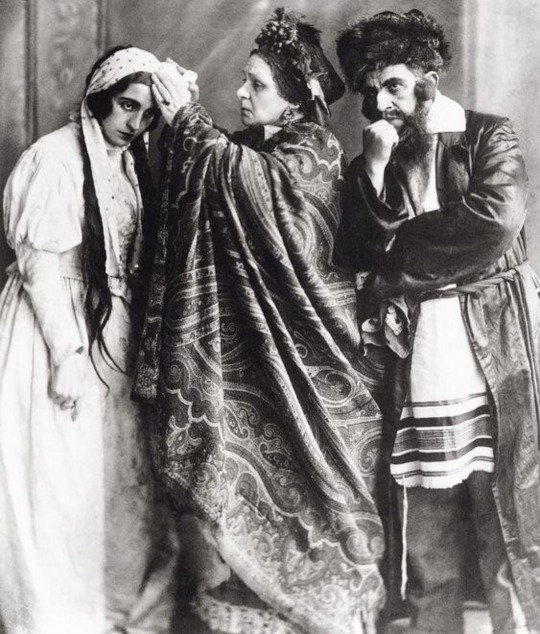
Scene from the most famous Yiddish play The Dybbuk by the Vilner Trupe. 1910s.
#jumblr#jewish#jews#nesyapost#jewish history#jewish culture#yiddish#Poland#Eastern Europe#jewish art#Jewish theater#Jewish actors#the dybbuk#1910s#yiddish folklore#Jewish folklore#ashkenazim#ashkenazi#photography#vintage photography
1K notes
·
View notes
Text
Star Wars writers when they can't come up with a word

#atlas entry#Rebels has Ezra Ephraim and Mira#and Zeb is similar to Ze'ev#Leia. of course#and now The Acolyte has an alien straight up just called a dybbuk#I'm wondering if one of the writers/creators is Jewish or if this is yet another example of a goy seeing Judaism and going “is this for me?#star wars#Rebels#star wars rebels#the acolyte#star wars the acolyte#star wars: rebels#star wars: the acolyte#disney#Disney plus#disney+
233 notes
·
View notes
Text
I need more jewish horror,, there is so much material to work with,, both religious and our general history
All the motifs, the symbolism, the anger, the grief, the ritualssss
#jumblr#pechambles#the only ones ive rlly seen are the two dybbuk movies#but ghost horror stuff isnt rlly my thing#and i cant rlly find much elsee#i want what catholics haveee ahdjfkfod
179 notes
·
View notes
Text

#polls#movies#the dybbuk#the dybbuk 1937#the dybbuk movie#30s movies#michał waszyński#avrom morewski#ajzyk samberg#mojzesz lipman#lili liliana#leon liebgold#requested#have you seen this movie poll
34 notes
·
View notes
Note
Maybe it’s a softball question, but I’d sure love to read an answer to “are dybbuk boxes actually Jewish?”. I know those things are still being sold on places like Etsy and eBay to this day.
Rating: Not Jewish
No, Dybbuk boxes are not real, they are misappropriations of Jewish spirituality and superstition. Dybbukim are a real concept in Judaism, they're a type of demon that clings to things, particularly people. "Dybbuk" comes from the Hebrew word of "Debek", which means "cling to".
However, Dybbuk boxes specifically are not a Jewish thing. They all originate from a hoax concocted in 2003 by Kevin Mannis, who exploited the Holocaust to sell his lie. His success has led to more people trying to cash in on his success on eBay and the like.
Here is an in-depth explanation of the situation by Jewitches:
-Mod Eitan
719 notes
·
View notes
Text
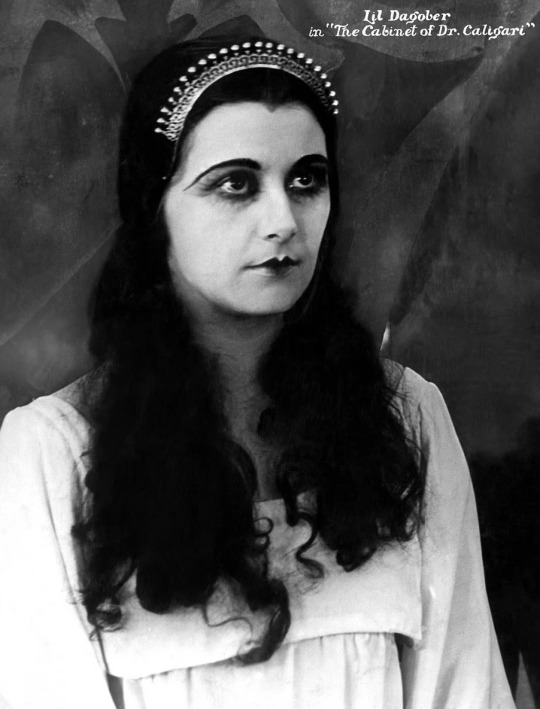
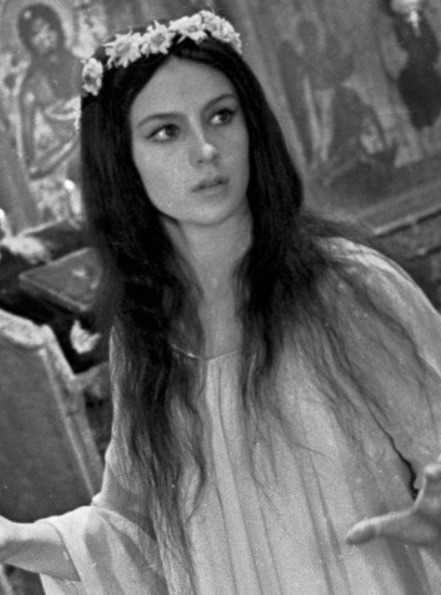
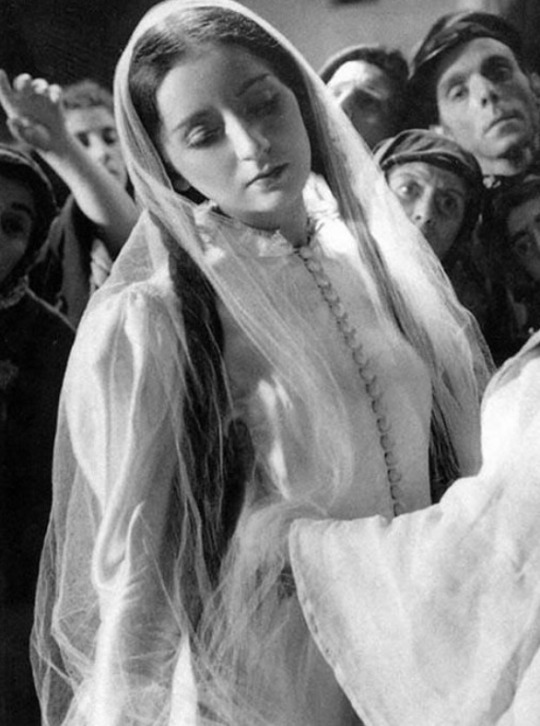
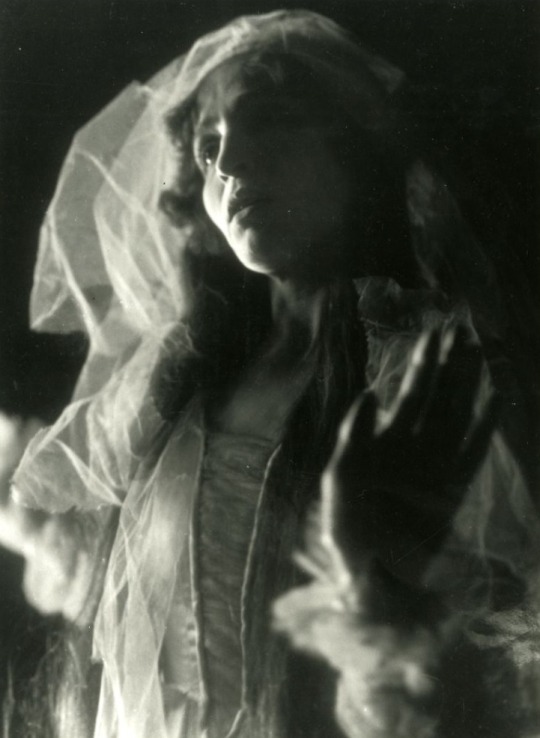
some of the Looks of all time
#la chute de la maison usher#the dybbuk#the cabinet of dr. caligari#viy#der dybbuk#the fall of the house of usher#das cabinet des dr. caligari#horror girls#gothic horror#women in horror#gothic heroine#lil dagover#natalya varley#lili liliana#marguerite gance#the fall of the house of usher 1928#viy 1967#gothic#beauty#gothic beauty#spooky girls tag#my posts#looks
604 notes
·
View notes
Text

The Dybbuk (1937)
47 notes
·
View notes
Text
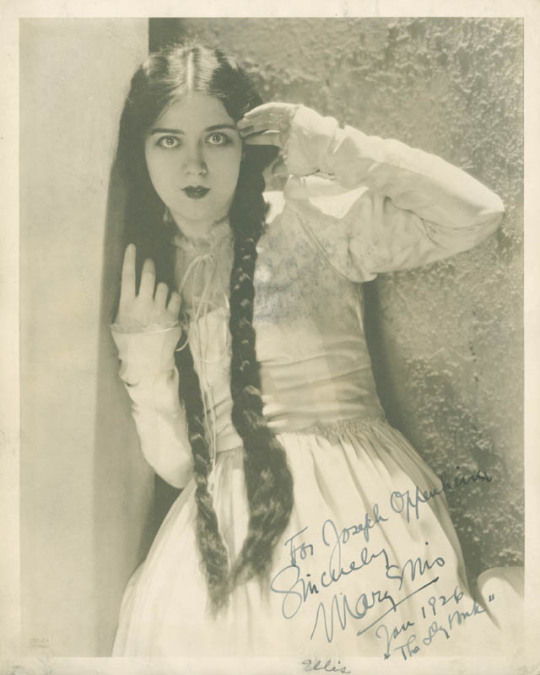
Extremely rare early sepia-toned publicity photo for the original Broadway production of The Dybbuk with actress Mary Ellis in a wedding dress and a damsel-in-distress pose, signed "Sincerely" in 1926 Photograph Inscribed and signed: "To Joseph Oppenheimer/Sincerely/Mary Ellis/Jan …"
249 notes
·
View notes
Text
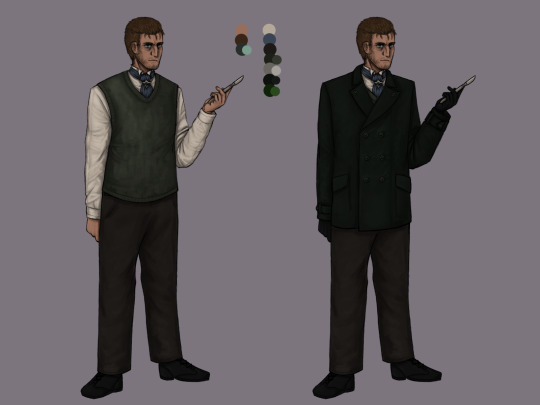


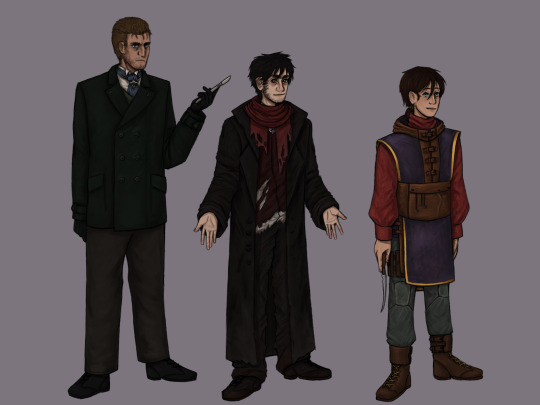
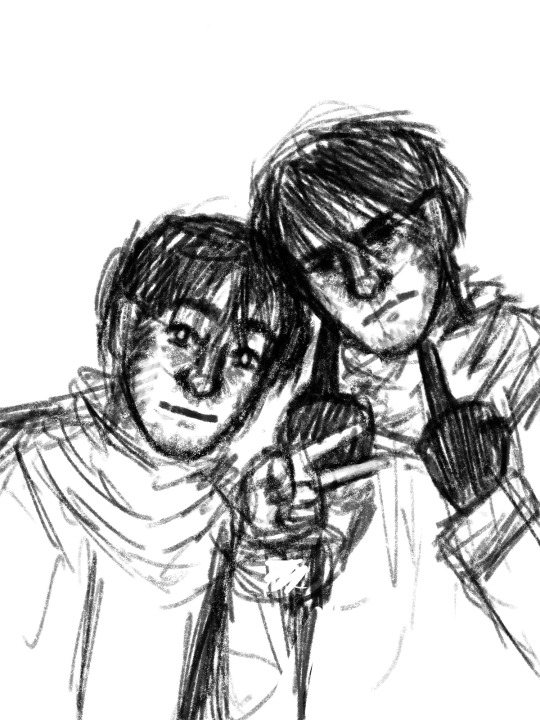
roleswap au things! more thoughts under the cut
In this au, clara was found by isidor as a baby out on the steppe, and adopted into the burakh family, much like in canon artemy leaves tog to go study, but in this one he actually gets a degree. On the other hand daniil starts by being the founder of the thanatica but leaves for tog and dies in the first outbreak. A year after that (4 years before the game would take place) artemy joins the thanatica and becomes it's head. While clara is trained as the menkhu
https://archiveofourown.org/works/55786033/chapters/141626062
#pathologic#daniil dankovsky#artemy burakh#clara pathologic#pathologic classic hd#pathologic 2#pathologic au#pathologic roleswap au#artemy is still a serial killer btw in fact he's worse#what happens when you make him dress up nice ig/j#daniil is a very jewish changeling in this one the plague is a dybbuk haunting his own dead body#artemy and clara are siblings who have been apart for 10 years and there's a lot of guilt and suffering there :]#art#digital art#artists on tumblr#my art#roots rain reflections#rain roots reflections
119 notes
·
View notes
Text
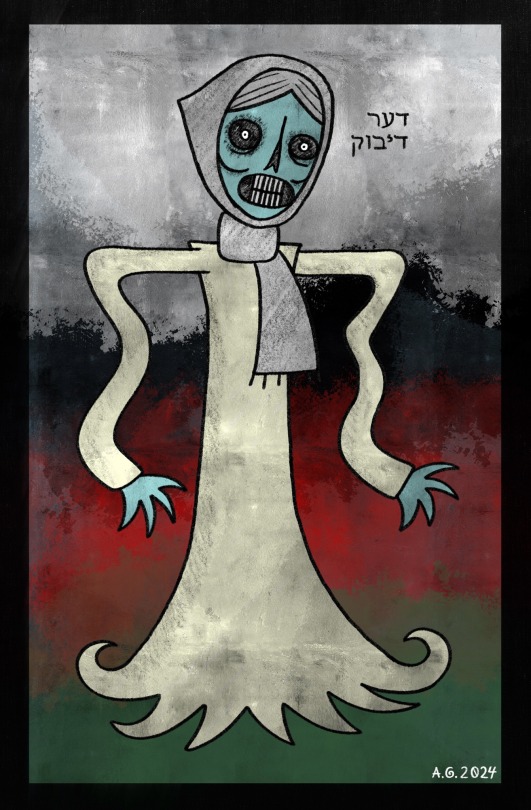
This is a portrait of a dybbuk that I made this year, I’m very happy with the design I came up with for this one! My favourite thing that I did for this design was the arms, the reason why they’re so long and noodly is because I picture another portrait where the dybbuk has its arms literally wrapped around a possessed individual like twine, in a sense visually being bound to its host, it feels very parasitic in a way that I’ve never seen before in depictions of possessions. Perhaps I shall make this sequel sometime in the future!
Anyways that will be all for today, I know that this was quite a short post this time, but sometimes short and concise is good! Gives room for the portrait to breathe. Be well all, I hope you all have a happy and joyous Hanukkah tomorrow!
28 notes
·
View notes
Text
Spent years and years insisting I was the only trans guy who didn't get even a little bit gay on T then watched Interview With the Vampire and experienced an Episode at the end of which I emerged a fundamentally different person and that person? Well it turns out they are a little bit of a gay guy
#I can't believe this is happening to me#The Dybbuk made me trans and vampires made me gay the other way#I am acted upon queerly by supernatural forces
32 notes
·
View notes
Text
BELOVED: A ghost story
To this day, I still have no idea what Beloved truly is (even though that's the whole point of her character). Most people write her off as just the ghost of Sethe's daughter, but in actuality, it's way, way more complicated than that. Morrison said once that Beloved represented every beloved person lost during the middle passage or due to the violence of slavery. This shows very well in Beloved's characterization. Yes, her core person is Sethe's daughter but there's also a lot of vindictiveness in her being. At first, she's mentally just a little girl wanting the warmth of her mother but then she turns mean and cruel, upset at being mercy-killed. Beloved's obsession with sugar kinda baffled me, but I guess many of the spirits within her used to work sugar plantations in the West Indies and since they weren't allowed to partake in the crop they grew, they're demanding it now through Beloved.
For the sake of discussion, let's settle on Beloved being the manifestation of every person forced to endure the trauma of slavery. Beloved craves. They crave the life denied them and crave some kind of compensation. They're angry, upset, restless, vengeful. Ghosts are theorized to be imprints left by the living and Beloved is all the imprints of African slaves rolled into one. She demands love from Sethe, sex from Paul D, companionship from Denver. In the end, she becomes a void sucking away at Sethe, a reminder that the past is easy to get trapped in and haunted by.
My personal theory on Beloved is that when Paul D drove her spirit out the house, she went to the afterlife and came back with the thoughts and memories of the other black people she interacted with down there. This is why her personality shifts dramatically as the book progresses. She's a revenant, poltergeist, wraith, dybbuk. She doesn't haunt the white people who perpetuated slavery, but those affected by it on a personal level. She is the past & trauma incarnate.
#beloved#beloved toni morrison#ghost#ghost story#literature#banned books#horror#grief#trauma#motherhood#black women#black writers#slavery#black people#sethe#denver#oprah winfrey#tw infanticide#wraith#dybbuk#black women writers
51 notes
·
View notes
Text

I watched the Dybbuk a few days ago, much to my delight. I found the Kino Classics Blu-ray collection called “Jewish Soul” which includes a bunch of Yiddish film that’s hard to find.
I’m watching it again today with the commentary track on and I’m so grateful for it. It’s by a film historian who gives perspective on story elements, context for the actors, comparison between the film and the play it was based on and information on the cultural setting. It helps so much and makes the movie that much more fascinating to me. ❤️
21 notes
·
View notes